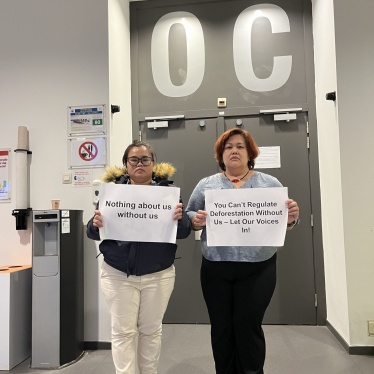Yesterday the European Commission proposed a substantial delay in the implementation of its landmark anti-deforestation law. This is bad news for the climate-critical forests around the world as well as the human rights of Indigenous peoples and other forest-dependent communities.
The European Union’s Deforestation-Free Products Regulation (EUDR) is a piece of legislation that required considerable study, negotiation, and compromise. It requires EU companies to ensure the wood, palm oil, soy, coffee, cocoa, rubber, and cattle they export or import has been produced in conditions that respect environmental laws and laws on land use rights, and that the products were farmed on land that was not deforested after 2020. It also requires the European Commission to designate areas as “low, standard, or high risk” for deforestation and forest degradation using a country benchmarking process.
The regulation entered into force in 2022 and requires companies to start complying on December 30, 2024. The commission proposed to push back the start of enforcement by 12 months for large companies and 18 months for micro and small enterprises. It also proposed delaying the country risk benchmarking process until June 2025, stating that the majority of countries would be ranked “low risk.”
The proposed delay is alarming, while the need for the EUDR is pressing. For example, HRW conducted an extensive assessment with partner organizations that indicates the Malaysian state of Sarawak is at high risk for deforestation and violations of Indigenous peoples’ rights. Millions of hectares of ancient rainforests in Malaysia are at risk of being razed for timber and oil palm plantations supplying international markets. The EU is the third-largest destination of Malaysian palm oil exports.
The commission’s proposed delay would enable at least one more year of deforestation and human rights violations in Sarawak, as well as other areas where deforestation is driven by the supply chains of products widely consumed by Europeans. It would also disregard efforts by many companies and EU trading partners who deployed resources to comply with the EUDR on time.
There is still a chance to reverse course, as the European Parliament and Council could refuse to approve the commission’s flawed proposal. The European Parliament and Council should oppose this delay and remind commission President Ursula von der Leyen of the urgency of enforcing this landmark environmental law.










